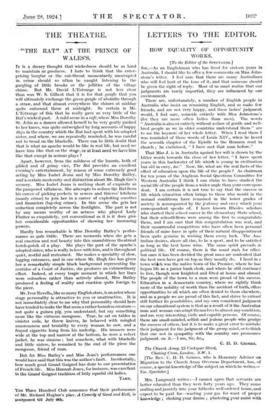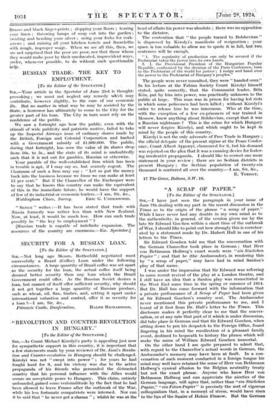LETTERS TO . THE EDITOR.
HOW EQUALITY OF OPPORTUNITY: WORKS.
. [To the Editor of the SPECTATOR.]
Sia,—As an Englishman who has lived for sixteen years in Australia, I should like to offer a few comments on Miss john- stone's letter. I feel sure that there are many Australians who will feel hurt at the tone of it, and that someone should be given the right of reply. Most of us must realize that our judgments are rarely impartial, they are influenced by-our environment.
There are, unfortunately, a number of English people in Australia who insist on remaining English, and so make few friends, and are not very happy, and these ladies' judgment would, .1 feel, sure, coincide entirely with Miss Johnstone's (for they are more often ladies than men). The words "Australia is almost entirelywithout a class of gentle and well- bred people as we in older countries understand. them;" are to me the keynote of her whole letter. When I read them I was reminded of those words of Louis XIV., when he heard the seventh chapter of the Epistle to the Romans read. in church ; he exclaimed, " I have met that man before." -
That Miss J. is in Australia against her will is shown by the bitter words towards the close of her letter, " I have spent years in this backwater of life which is young in civilization but old in envy, &c." Now, Sir, what are the real facts of the effect of education upon the life of the people ? As chairman for ten years of the Anglican Social Questions Committee for Western Australia I think I can claim to have studied the social life of the people from a wider angle than your correspon- dent. I am certain it is not true to say that the success in life ,which education- often brings to those who would in the normal conditions have remained in the lower grades of society is accompanied by the jealousy and envy which your correspondent speaks of. I have known Rhodes scholars who started their school career in the elementary State school, but their schoolfellows were among the first to congratulate them, and I am sure that this congratulation was real, and their unsuccessful competitors who have often been personal friends of mine- have in spite of their natural disappointment been quite genuine in wishing them every luck. The Aus- tralian desires, above all else, to be a sport, and to be satisfied as long as the best horse wins. The same spirit prevails in political life. Of course, there is the usual rush for office, but once it has been decided the great mass are contented that the best men have got on top as they usually do. I lived in a town which was the native town of the Premier, where he had begun life as a junior bank clerk, and where he still continued to live, though now knighted and feted at home and abroad. The people of the town to a man were proud of his success. Education in a democratic country, where we rightly think
more of the nobility of worth than the- accident of birth, offers opportunities to all which are often denied to them elsewhere, and as a people we are proud of this fact, and strive to extend still further its possibilities, and my own considered judgment on our educational system is that-as a result of it the Australian man and woman can adapt themselves to almost any condition, and arc very interesting, virile and capable persons. Of course, there are small-minded; selfish-and jealous people who grudge the success of others, but it is to make a great error to mistake their judgment for the judgment of the group mind, or to think that one not in sympathy with the country can pronounce judgment. on am, Sir, &c.,
C. H. D. GIIIItLES, The Church Army, 25 Cockspur Street, Charing Cross, London, S.W. 1.
[The Rev. C. II. D.. Grimes, who is Honorary Adviser on Migration to the Church Army Overseas Department, has,- of course, &special knowledge of the subject on which he writes.— ED. SpeCtatOT.]
Mrs. Langmaid writes :—I cannot agree that servants are better educated than they were forty years ago. They come smiling and jauntily into your hitherto well-ordered home, and expect to be•paid for—wasting your gas for want of proper knowledge ; choking your drains ; plastering your paint with
Brasso and black finger-prints ; slopping your floors ; tearing your linen ; throwing luirips of soap out into the garden ; twisting and bending your silver ; using your -forks for cork- ;crews ; and ruining all your kitchen towels and floorcloths with rough, improper usage. When we see all this, then, we are not surprised that the poor are poor, nor that those whom they would make poor by their uneducated, improvident ways, prefer, whenever possible, to do without such questionable 114?















































 Previous page
Previous page